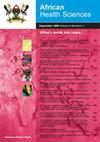The practice of using repurposed medications as chemoprophylaxis for COVID-19 by healthcare workers in a tertiary hospital in Southern Nigeria
IF 0.9
4区 医学
Q3 MEDICINE, GENERAL & INTERNAL
引用次数: 0
Abstract
Background: Coronavirus disease 2019 (COVID-19) is a viral infection that has been reported in virtually every country. Healthcare workers (HCW) are more at risk of COVID-19 than the general population making them a priority group for vaccination. Before the roll out of COVID-19 vaccines in Nigeria, some HCW were using some repurposed, unapproved drugs to possibly prevent the disease. This study evaluated the frequency and pattern of drug use for COVID-19 prevention. Methods: This was a prospective cross-sectional study of HCW conducted in Southern Nigeria. Data was obtained from the participants using a questionnaire and blood sample was obtained for SARS-CoV-2 antibody testing. Data was analysed using the statistical package for social sciences (SPSS) version 23. Results: One hundred and sixty-six participants were enrolled in this study. Thirty-two (19.3%) of them had taken a repurposed medication as prophylaxis for COVID-19. The most used drugs were Vitamin C (9%), Azithromycin (8.4%) and Zinc (6.6%). History of contact with patient with confirmed COVID-19 and being a pharmacist were independent factors associated with the use of COVID-19 prophylaxis. Conclusion: Several HCW in Nigeria take drugs to possibly prevent COVID-19. These medications may not offer significant protection against COVID-19. There is an urgent need to increase uptake of COVID-19 vaccines in HCW in Nigeria. Keywords: COVID-19; Chemoprophylaxis; Healthcare workers.尼日利亚南部一家三级医院医护人员使用重新用途药物作为COVID-19化学预防的做法
背景:2019冠状病毒病(COVID-19)是一种病毒性感染,几乎每个国家都有报告。卫生保健工作者比一般人群更容易感染COVID-19,因此他们是接种疫苗的优先群体。在尼日利亚推出COVID-19疫苗之前,一些HCW使用了一些未经批准的重新用途药物来预防这种疾病。本研究评估了预防COVID-19的药物使用频率和模式。
方法:这是在尼日利亚南部进行的一项前瞻性横断面研究。通过问卷调查获得参与者的数据,并采集血样进行SARS-CoV-2抗体检测。数据分析使用社会科学统计软件包(SPSS)版本23。
结果:166名参与者被纳入本研究。其中32人(19.3%)曾服用改用药物预防COVID-19。使用最多的药物是维生素C(9%)、阿奇霉素(8.4%)和锌(6.6%)。与确诊COVID-19患者的接触史和药剂师是与COVID-19预防药物使用相关的独立因素。
结论:尼日利亚部分HCW患者用药可能预防COVID-19。这些药物可能无法有效预防COVID-19。迫切需要在尼日利亚的HCW中增加COVID-19疫苗的吸收。关键词:COVID-19;化学预防;卫生保健工作者。
本文章由计算机程序翻译,如有差异,请以英文原文为准。
求助全文
约1分钟内获得全文
求助全文
来源期刊

African Health Sciences
MEDICINE, GENERAL & INTERNAL-
CiteScore
2.30
自引率
0.00%
发文量
179
审稿时长
>12 weeks
期刊介绍:
The African Health Sciences is an internationally refereed journal publishing original articles on research, clinical practice, public health, policy, planning, implementation and evaluation, in the health and related sciences relevant to Africa and the tropics. Its objectives are to: Advocate for and promote the growth of reading culture in sub Saharan Africa; Provide a high quality journal in which health and policy and other researchers and practitioners in the region can and world wide, can publish their work; Promote relevant health system research and publication in the region including alternative means of health care financing, the burden of and solution of health problems in marginalized urban and rural communities amongst the displaced and others affected by conflict; Promote research and the systematic collection and collation and publication of data on diseases and conditions of equity and influence; Promote development of evidence-based policies and guidelines for clinical, public health and other practitioners. African Health Sciences acknowledges support provided by the African Health Journals Partnership Project that is funded by the US National Institutes of Health (through the National Library of Medicine and the Fogarty International Center) and facilitated by the Council of Science Editors.
 求助内容:
求助内容: 应助结果提醒方式:
应助结果提醒方式:


